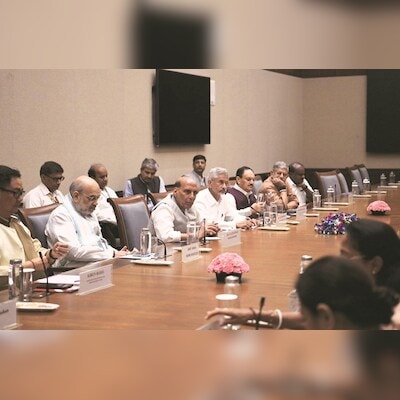)
External Affairs Minister S Jaishankar, Defence Minister Rajnath Singh, and Home Minister Amit Shah at an all-party meeting about the ongoing developments in Bangladesh, in Parliament House on Tuesday | Photo: PTI
The government in Parliament on Tuesday expressed its deep concern over a surge of violence targeting minorities in Bangladesh, a day after Sheikh Hasina resigned as its prime minister and escaped to India amid unrelenting protests.
The violence in the neighbouring country has been severe and unforgiving with numerous Hindu temples, homes, and businesses targeted and vandalised, women assaulted, and at least two Hindu leaders affiliated with Hasina’s Awami League killed. In a particularly horrific incident, 24 people were burned alive at a luxury hotel owned by an Awami League leader in Jessore district, adding to the toll of 440 deaths in the latest spate of unrest.
Earlier that day, Jaishankar briefed political leaders at an all-party meeting and addressed Parliament in the afternoon regarding Bangladesh’s turmoil. At the all-party meeting, according to sources, he described Hasina, who landed at Hindon airbase after fleeing from Dhaka, as being in shock at the rapid turn of events. She has been given time to recuperate before determining her next course of action.
During the all-party meeting, Jaishankar did not dismiss the possibility of foreign involvement in Bangladesh’s unrest while replying to questions from political leaders like Rahul Gandhi, the leader of opposition in the Lok Sabha. However, he stressed that the situation remained highly fluid and that the Indian government was closely monitoring developments, the sources said.
Government sources indicated that India has informed Hasina that she could remain in the country for a few more days while exploring asylum options in Europe. Her initial plan to travel to London via India hit a roadblock when the UK Home Office clarified that British immigration rules do not allow individuals to travel to that country to seek asylum or temporary refuge.
In his statement in Parliament, Jaishankar described the violence against minorities in Bangladesh as “worrying” and acknowledged that “its full extent is still not clear”. He assured that New Delhi maintains “close and continuous” communication with the Indian community in Bangladesh through diplomatic channels and the Bangladeshi authorities.
Jaishankar noted that there are approximately 19,000 Indian nationals in Bangladesh, including 9,000 students, most of whom returned to India in July after violent protests broke out. He emphasised India’s expectations for the Bangladeshi government to safeguard its High Commission in Dhaka and Assistant High Commissions in Chittagong, Rajshahi, Khulna, and Sylhet. Additionally, India’s border guarding forces have been instructed to remain exceptionally vigilant.
Explaining Hasina’s sudden resignation and her subsequent refuge in India, Jaishankar said: “At very short notice, she requested approval to come for the moment to India. We simultaneously received a request for flight clearance from Bangladesh authorities. She arrived yesterday evening in Delhi.”
He noted that India consistently urged the government in Dhaka to exercise restraint and encouraged dialogue to defuse the situation. “Similar urgings were made to various political forces with whom we were in touch,” Jaishankar added, tracing the origins of the crisis to the divisive elections in Bangladesh in January 2024, which fostered considerable tension, polarisation, and the eventual eruption of a student-led agitation in June.
Despite the Bangladesh Supreme Court’s decision on July 21 to scale back the controversial quota system for government job applicants, public agitation persisted. Jaishankar explained that “various decisions and actions taken thereafter only exacerbated the situation. The agitation at this stage coalesced around a one-point agenda, that is, that the prime minister, Sheikh Hasina, should step down.”
Hasina’s travel plans
Hasina had intended to travel to London with her sister, Sheikh Rehana, via India, but her plans were shelved after the UK government indicated she might not receive legal protection against potential probes into the violent protests in Bangladesh. British Foreign Secretary David Lammy called for a “full and independent UN-led investigation” into the unprecedented violence and tragic loss of life over the past fortnight.
Sources claimed Belarus and a couple of countries in West Asia, the UAE and Saudi Arabia, are also being considered for asylum. Hasina has family ties in the US as well, but Washington had in recent months repeatedly expressed concerns about the state of democracy in Bangladesh, particularly after the Awami League won in January 2024.
Attacks on minorities
The European Union (EU) Heads of Mission in Dhaka have expressed deep concern over the attacks on places of worship and ethnic minorities in Bangladesh. In a statement, they urgently appealed for restraint and the protection of fundamental rights for all Bangladeshis.
Community leaders report widespread vandalism of Hindu temples and businesses, alongside violence against women and targeted killings of Hindu leaders associated with the Awami League. The Bangladesh Hindu Buddhist Christian Unity Council described the situation as grave, with Hindus facing relentless assaults nationwide.
In Parliament, Jaishankar sought solidarity and understanding from the House on this sensitive issue concerning a crucial neighbour on which “there has always been strong national consensus”. He highlighted the broad consensus across the Indian political spectrum regarding concern over Bangladesh’s violence and instability.
During the all-party meeting, Trinamool Congress (TMC) leader Sudip Bandyopadhyay underscored the importance of keeping the West Bengal government informed about developments in Bangladesh, given its geographical proximity and likely impact. TMC’s Derek O’Brien later echoed this sentiment, stressing West Bengal’s vulnerability to the unfolding crisis next door.
First Published: Aug 06 2024 | 9:46 PM IST
